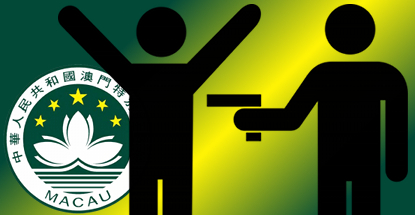 Casino-related crime in Macau rose more than one-third in the first half of 2015 but politicians claim the spike is unrelated to the city’s ongoing gaming revenue slump.
Casino-related crime in Macau rose more than one-third in the first half of 2015 but politicians claim the spike is unrelated to the city’s ongoing gaming revenue slump.
On Friday, Macau’s Secretary for Security Wong Sio Chak released the latest crime statistics compiled by the special administrative region’s police. The number of criminal cases related to Macau’s gaming industry rose 34.5% to 679, despite Macau’s overall number of criminal cases falling 0.9% to 7,025. Worse, the pace of casino crime is accelerating, as Q1’s total was up only 22.5% year-on-year.
The most striking rise came in the number of unlawful detention cases – where gamblers who can’t pay their debts are held against their will while friends or relatives on the mainland scramble to make the lenders whole – which rose 112.5% to 170, while usury and loan-sharking cases were up 39%.
Violent crimes were (mercifully) up a mere 3% and Macau recorded no instances of murder, kidnapping or crimes related to triad groups. Counterfeit currency cases fell 55.4%, because when there’s a lot less real money floating around, there’s fewer opportunities to pass the bogus bucks.
Wong claimed that “so far there hasn’t been enough evidence” to suggest that Macau’s 14-month long revenue decline is responsible for the increase in casino criminality. In fact, Wong suggested the increase in recorded crime was because police were getting better at detecting illegal activity.
Mindful that the public might not swallow that last claim, Wong said officials would continue to monitor the situation closely and police would remain on “high alert” in a bid to prevent casino crimes from occurring in the first place.
Wong took pains to note that most cases of casino-related crime had occurred on casino premises, meaning local residents were largely unaffected by the incidents. Around 92% of usury cases and 77% of unlawful detentions were recorded happening within the casinos themselves.
That’s a good thing, because there’s mounting antipathy being shown by Macau’s locals towards the hordes of tourists that Macau’s casinos attract. A new University of Macau study found that local residents were “increasingly feeling and expressing negative sentiment towards tourism.”
The study’s participants weren’t adamantly opposed to the casino industry, although those who didn’t work in the industry were far less supportive of it. The antipathy had more to do with the Macau government’s perceived failure to boost infrastructure to properly handle the volume of tourists lured to Macau by the casinos.
